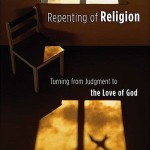We run our website the way we wished the whole internet worked: we provide high quality original content with no ads. We are funded solely by your direct support. Please consider supporting this project.

Love OR Judgment – You Can’t Have Both
Image by Morgan Sessions
We cannot judge others because it is not our place as humans to function as the center—because God is that center—and judge other people. In addition, we cannot judge others because we ourselves are sinners who deserve judgment. If we don’t want to be judged, Jesus says, we must not judge. The measure of the judgment we give is the measure with which we shall be judged.
This is why human judgments are always hypocritical. The act of judging others subjects us to the same judgment we apply to them. The hypocrisy of our judgment is manifested in the fact that it is always selective and self-serving. Because we are trying to fill the vacuum in our spirit with our judgments, we amplify the sins of others while minimizing our own sins.
Jesus teaches the exact opposite (Matt 7). We should consider our own sins to be logs and other people’s sins to be specks. The picture of people with tree trunks sticking out of their eyes looking for dust particles in other people’s eyes is absolutely ludicrous—and that is the point. We are finite, sinful human beings, and as such, we have no business setting ourselves up as the moral police of others, acting as though we know the state of other people’s hearts and concluding that we are in any way superior to them.
While we can discern the impact of behavior, the only conclusion we are allowed to know about a person’s heart is that he or she has infinite worth before God.
In Matthew 7, Jesus is doing nothing less than contrasting two mutually exclusive ways of living. We either live in love, or we live in judgment. The extent to which we do one is the extent to which we do not do the other. If we stand in judgment and do not forgive, we ourselves will be judged and not forgiven (Matt 6:14-15). If we do not show mercy, we will not be given mercy (James 2:13). If we condemn others, we will stand condemned (Luke 6:37).
Conversely, if we die to ourselves as the center and thus die to ourselves as judge, we will receive the life of one who will never be judged. If we accept Christ’s reconciling act and simply have faith that God is who he says he is in Christ, that we are who God says we are in Christ, and that all others are who God says they are in Christ—in other words, if we simply abide in love—then, in fact, all we are is defined in Christ. In Christ there is no judgment (Rom 8:1), for we have entirely opted out of the judgment game created when we lost Paradise.
Recognizing that we can only lose in this game, for we are ourselves sinners, we no longer try to get life by critically evaluating ourselves or others before God. We simply receive, live in, and give the love and mercy of God that has triumphed over judgment.
—Adapted from Repenting of Religion, pages 109-111
Category: General
Tags: Judgment, Living in Love, Love, Repenting of Religion
Topics: Following Jesus
Related Reading

How God Changes the World
God’s hopes for us began before the creation of the world. And what God intended from the beginning gives us insight into how God works to bring about what he intends. In the first chapter of Ephesians, Paul teaches that God “chose us in [Christ] before the creation of the world to be holy and…

Quotes to Chew on: God’s Love When We Rebel
“Despite the fall and its consequent curse, however, God’s love was not deterred. God is love. God doesn’t stop being God simply because the humans he created have rebelled against him. God does not abandon his goal of having others share in the eternal, ecstatic dance of the Father, Son and Holy Spirit. The world…

Spiritual Warfare: What is it?
The Kingdom is “not of this world,” and neither is its warfare. Jews had always believed that God confronted spiritual opposition in carrying out his will on earth. In the Old Testament, these evil forces were usually depicted as cosmic monsters and hostile waters that threatened the earth. For a variety of reasons this belief…

The Extremity of God’s Love
In response to questions he has received about whether Jesus was actually separated from the Father on the cross, Greg fleshes out his perspective on this. The love that unites the Trinity is the very same love that resulted in the separation of the Father from the Son. This separation actually expresses the great love…

5 Differences Between The Kingdom of God and the Kingdom of the World
Image by matthijs rouw via Flickr The kingdom of God looks and acts like Jesus Christ, like Calvary, like God’s eternal, triune love. It consists of people graciously embracing others and sacrificing themselves in service to others. It consists of people trusting and employing “power under” rather than “power over,” even when they, like Jesus, suffer because…

Love Never Stops
Greg reflects here that he can be a very cynical person if you ask him about the state of the world around us, but the love of God demonstrated in the Easter narrative gives him confidence and hope. We hope this blesses you as you move through holy week. You can find more videos like this…
